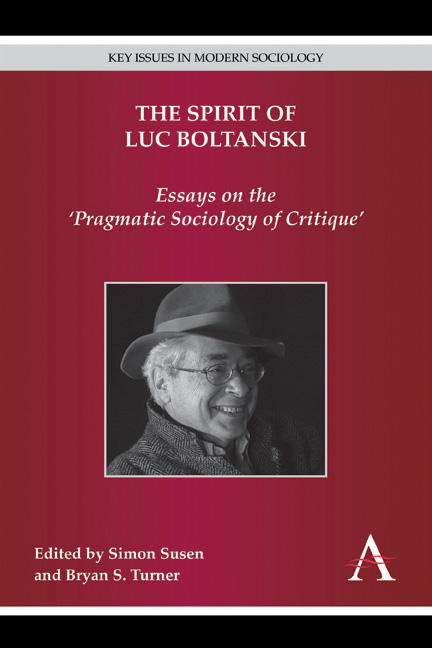Book contents
- Frontmatter
- CONTENTS
- List of Contributors
- Preface
- Part I Introductory Remarks
- Part II Luc Boltanski and (Post-) Classical Sociology
- Part III Luc Boltanski and Pragmatism
- Part IV Luc Boltanski and Critique
- Part V Luc Boltanski and Critical Sociology
- Part VI Luc Boltanski and Political Sociology
- Part VII Luc Boltanski and Contemporary Issues
- Part VIII Luc Boltanski in Conversation
- 22 An Introduction to ‘“Whatever Works”: Political Philosophy and Sociology – Luc Boltanski in Conversation with Craig Browne’
- 23 ‘Whatever Works’: Political Philosophy and Sociology – Luc Boltanski in Conversation with Craig Browne
- 24 Sociology of Critique or Critical Theory? Luc Boltanski and Axel Honneth in Conversation with Robin Celikates
- 25 The Fragility of Reality: Luc Boltanski in Conversation with Juliette Rennes and Simon Susen
- Part IX Luc Boltanski and His Critics
- Index of Names
- Index of Subjects
24 - Sociology of Critique or Critical Theory? Luc Boltanski and Axel Honneth in Conversation with Robin Celikates
from Part VIII - Luc Boltanski in Conversation
Published online by Cambridge University Press: 05 December 2014
- Frontmatter
- CONTENTS
- List of Contributors
- Preface
- Part I Introductory Remarks
- Part II Luc Boltanski and (Post-) Classical Sociology
- Part III Luc Boltanski and Pragmatism
- Part IV Luc Boltanski and Critique
- Part V Luc Boltanski and Critical Sociology
- Part VI Luc Boltanski and Political Sociology
- Part VII Luc Boltanski and Contemporary Issues
- Part VIII Luc Boltanski in Conversation
- 22 An Introduction to ‘“Whatever Works”: Political Philosophy and Sociology – Luc Boltanski in Conversation with Craig Browne’
- 23 ‘Whatever Works’: Political Philosophy and Sociology – Luc Boltanski in Conversation with Craig Browne
- 24 Sociology of Critique or Critical Theory? Luc Boltanski and Axel Honneth in Conversation with Robin Celikates
- 25 The Fragility of Reality: Luc Boltanski in Conversation with Juliette Rennes and Simon Susen
- Part IX Luc Boltanski and His Critics
- Index of Names
- Index of Subjects
Summary
The ‘sociology of critique’ and ‘critical theory’ offer different perspectives on the phenomenon of critique. The former approach has been developed by Luc Boltanski, as well as by other members of the Groupe de Sociologie Politique et Morale (GSPM), with the aim of providing an alternative to Pierre Bourdieu's ‘critical sociology’. The latter approach has been developed further by Axel Honneth, who proposes a ‘theory of recognition’, and whose work descends from the tradition of the Frankfurt School. Is critique, first and foremost, an achievement of ‘ordinary’ actors or a task of theory? What is the relationship between theory and practice? How can theory be critical and, at the same time, draw upon actors’ experiences and interpretations? These questions, as well as the – partly complementary and partly conflicting – answers given by the aforementioned approaches, both of which are crucial to contemporary debates in social philosophy, play a pivotal role in the following conversation.
I
Robin Celikates: Let us begin by reflecting upon the genesis of the two approaches. How have the sociology of critique and the theory of recognition developed as distinct paradigms? What role have diverging currents of thought, empirical issues, and specific intellectual constellations played in this respect? On the one hand, we have the tradition of critical theory and particularly its recent reorientation, proposed by Jürgen Habermas, as well as a certain dissatisfaction with the formal-pragmatic strategy, which suffers from a significant degree of ‘de-substantialization’ and ‘de-sociologization’. On the other hand, we find Pierre Bourdieu's critical sociology and the confrontation with empirical problems, which have led to the development of a new theoretical vocabulary aimed at making the description of certain social phenomena possible in the first place.
Luc Boltanski: I struggle with grand theoretical lines of development, especially at the moment, because – to borrow an expression used by Albert Hirschman – I am immersed in a phase characterized by a ‘propensity to self-subversion’.
- Type
- Chapter
- Information
- The Spirit of Luc BoltanskiEssays on the 'Pragmatic Sociology of Critique', pp. 561 - 590Publisher: Anthem PressPrint publication year: 2014

